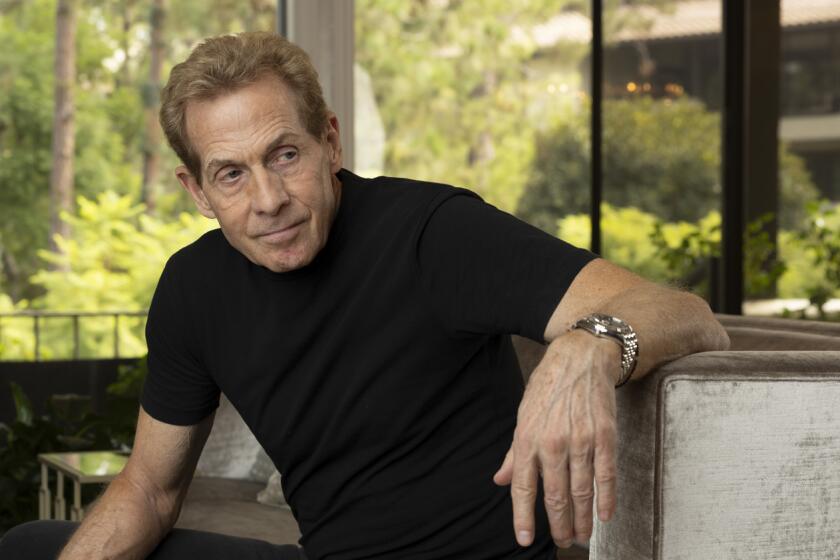Opposition to China float fails to blossom
The shell of the Rose Parade float celebrating the 2008 Beijing Olympic Games sits in a sprawling warehouse complex in Azusa.
In a matter of hours, it will be adorned with thousands of carnations and roses, outfitted with fireworks and accompanied by 124 costumed Beijing opera singers, acrobats, traditional dancers and plate spinners down Colorado Boulevard.
Critics of China’s communist government hoped to use the elaborate float and its worldwide stage at the Rose Parade on Tuesday as a rallying point for protests about the nation’s human rights record.
But despite months of news conferences and protests, China foes have done little to change the parade’s plans and have generated little support -- or interest -- from Southern California’s large Chinese American community.
The lukewarm response underscores the increasingly close relationship Southern California shares with China. There may be no other time in which China has commanded as much influence and interest as it does today.
The San Gabriel Valley is home to one of the largest Chinese American communities in the nation and a growing business class that has made Southern California the chief trading region with China in the United States. To many, the 12-hour or longer flight to Beijing, Shanghai or Guangzhou is more of a commute than a voyage.
Business ties between the two countries forge quickly, and though many here believe China needs to improve its approach to human rights, more attention is paid to fueling the economy to improve the lot of ordinary Chinese.
“We haven’t talked about it,” said Cat Chao, host of a popular Mandarin-language talk show on KAZN-AM (1300), about the Olympics float. “The majority of Chinese think the Olympics is bigger than human rights and that human rights are already improving. They’d rather see China improve on issues like pollution.”
Philip Young, president of the local Chinese American Citizens Alliance, said he planned to attend the Rose Parade. But he’ll be there to cheer his teenage son and daughter in the Arcadia High School marching band, not to applaud or dismiss the Beijing float.
“China needs to improve its human rights record like any country, but to pick the Rose Parade as the forum is inappropriate,” Young said.
“I’m really turned off. As a Chinese American, I’m proud China is having the Olympics. It’s their coming-out party. After 20, 30 years of economic improvement, it’s sad that some still see China as a threat and not an opportunity,” he said.
Even local supporters of independence for Taiwan -- who rarely miss a chance to condemn China’s government -- have largely stayed out of the parade debate.
Some Taiwan activists will hand out fliers at the parade. But after much debate among community leaders, they decided it was too risky to criticize the float because it had such broad backing among local Chinese, some of whom they rely on for support.
“If we come out and protest this float in public, we may anger many Chinese people in L.A.,” said a leading local Taiwanese activist who wanted to remain anonymous because of the sensitivity of the internal debate. “They consider the Beijing Olympics a point of pride. We don’t want a war between the Chinese and Taiwanese in L.A.”
At the heart of the issue is a float celebrating China’s first Olympic Games -- apropos, tournament officials say, because the upcoming parade’s theme is “Passport to the World’s Celebrations.” Backers say China’s government had no role in building the float, and that it was paid for by Pasadena-based label maker Avery Dennison Corp. and a coalition of Chinese American business people and philanthropists.
Many of the donors, including Avery Dennison, have significant business interests in China, but through representatives they have denied that those relationships played a role in their decision to fund the float.
A disparate group of activists banded together to block the float but failed. The Pasadena City Council dismissed the recommendations of its own human relations commission to issue critical remarks on China’s human rights record.
And after weeks of negotiations, activists failed to reach an agreement with Pasadena police to allow an event on or near the parade route to counter the Olympics float.
Left with no other option, protesters have pledged to turn their backs on the float when it passes them along the parade route on New Year’s Day.
The activists acknowledged that they have struggled to generate widespread support in the Chinese American community. But they believe their failure comes less from support of the float than out of fear.
“Most Chinese don’t dare to speak out against the Chinese Communist Party,” said John Li, president of the Caltech Falun Gong Club, one of the original critics of the float. “They worry their business [with China] can be influenced if America puts pressure on China’s human rights record.”
Li said he’s tried to persuade fellow Chinese on the Caltech campus to join him, but he said the fear of government retribution drives them to silence.
“I ask them if they want their children to be persecuted for having different beliefs” when they return to China, Li said. “Our job is to wake them up. I feel more and more are waking up. For example, in the past the Chinese media kept silent reporting on human rights. But now I see more and more of them coming here.”
Part of the problem may be who’s delivering the message. Though the protesters represent a variety of interests -- including those for Tibetan independence and critics of China’s hand in Myanmar, also known as Burma -- no group has had a more polarizing effect than the Falun Gong, which has been the chief instigator behind the opposition in Pasadena.
The group, which is loosely bonded by a belief in Chinese breathing exercises, is outlawed in China as a spiritual cult.
Adherents have been imprisoned and tortured by Chinese authorities who deem the group a threat to their ideological hegemony.
Despite evidence of their mistreatment, they have failed to generate lasting sympathy from the Chinese American community at large, where some label the Falun Gong as a fringe group.
“They’re visible because they have devoted members, but they don’t have a large following,” said Yong Chen, who teaches history and Asian American studies at UC Irvine. “The perception among many people is that the Falun Gong is not equivalent to human rights.”
Chao was more blunt. “A lot of Chinese think it’s voodoo stuff,” she said.
Adherents admit their toughest skeptics are fellow Chinese. But winning them over isn’t necessarily crucial. Latching on to an event as widely viewed as the Rose Parade has already proved beneficial, they say.
“All the human rights activists know the first and most difficult step in stopping persecution is to get exposure,” said Shizhong Chen, a Falun Gong practitioner heavily involved in the opposition campaign. “What happens in Pasadena adds to the exposure. Leading up to the Olympics, such opportunities will [arise] more and more . . . This serves as a kickoff event for human rights causes.”
Reporters Without Borders recently unveiled a billboard on the corner of Arroyo Parkway and Del Mar Boulevard in Pasadena that depicts the Olympic interlocking rings made of handcuffs. Underneath, it reads “Beijing 2008.”
At one point, a caravan of supporters protested outside the house of Pasadena Mayor Bill Bogaard, who has been accused of engineering the idea for a Beijing Olympics float and led the City Council’s refusal to issue a resolution expressing concern over China’s human rights record.
Since the 1989 Tiananmen Square crackdown on student demonstrators, human rights groups have accused China of mistreating those who oppose the ruling Communist Party. They charge Beijing with a litany of abuses, including imprisonment without proper trial, torture and the harvesting of organs from executed prisoners.
Earlier this year, Amnesty International released a report saying China had failed to live up to its promises to improve human rights in the lead-up to the Olympics by detaining activists, stifling domestic journalism and clearing the streets of Beijing of petty criminals and vagrants in preparation for the Summer Games.
But defenders of the float have argued that the entry represents the athletic spirit of the Olympic Games, not China’s government.
Riding several entries behind the Olympic float in a 1911 Pope-Hartford touring car will be the mayor, who hopes the float will bring greater mutual understanding between the United States and China.
“Relations between the U.S. and China are so numerous and so substantial that people find it difficult to engage in daily life -- where every other product in your hand is made in China -- and at the same time suggest that there should be total condemnation of China and the Chinese government,” he said.
“We all recognize that China is a player on the world scene.”
--
More to Read
Go beyond the scoreboard
Get the latest on L.A.'s teams in the daily Sports Report newsletter.
You may occasionally receive promotional content from the Los Angeles Times.










